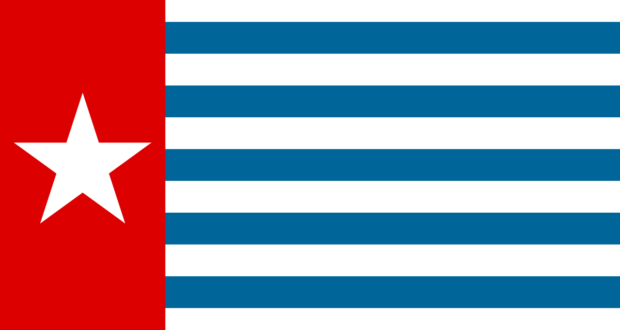21 November, 2021
By Jessica Honan – Research Assistant
West Papua has been a territory of Indonesia since it was annexed by the Southeast Asian country in 1962. Before then, it was a Dutch colony and has been a UN Trust territory. However, West Papuans have continuously agitated for independence on the basis of their distinct ethnic, cultural and religious diversity to the majority of Indonesia. Calls for independence have been met with human rights abuses by the Indonesian government including extra-judicial arrests, torture and violence. The West Papuan’s independence movement is partially underpinned by the existence of the right to self-determination in international law. This right to self-determination is complex and an unsettled area of law, though it is accepted that it can be split into two types: ‘external’ and ‘internal’ self-determination. ‘External’ self-determination underpins the West Papuan independence movement, as it is the right to be free from an external power’s control.
External self-determination does not include a unilateral right to secede. However, secession might not be prohibited in international law where the colonised people are severely persecuted and the State lacks will or power to protect their rights. Notably, the European Court of Human Rights in Loizidou v Turkey found a ‘people’ could secede if their ‘human rights are consistently and flagrantly violated or if they are without representation’. This indicates that in cases of human rights abuses, such as that in West Papua, external self-determination may not prohibit secession. However, West Papua must first be entitled to external self-determination. External self-determination is limited to a certain situation: namely, it is reserved for a ‘people’ within a Non-Self-Governing Territory (NSGT). This form of self-determination is reactionary to colonisation – it is supposed to be a framework during the decolonisation era.
The first element – whether West Papuans constitute a people – is complex and controversial. ‘People’ is not defined under international law. Whereas some academics find a population within a NSGT automatically a people by virtue of their collective disenfranchisement, general consensus is that there are probably certain elements that have to be satisfied. The International Court of Justice turned its mind to the question of what constitutes a ‘people’ in its 2010 Advisory Opinion on the legality of Kosovo’s declaration of Independence. In this case, the Court’s proposed criteria had both objective and subject elements. Traditions, ethnicity, historical ties, language, religion, and common suffering are objective elements. The subjective element is a common belief that they are a ‘people’ on the basis of sharing certain beliefs and customs.
Under the objective element, West Papuans fulfil many criteria. Papuan Malay is the lingua franca rather than Indonesian; Papuans are majority Christian rather than Muslim; and face a ‘common suffering’ due to their ongoing oppression. West Papuans’ ethnic diversity does not detract from the satisfaction of the objective element. Again, in the Kosovo Advisory Opinion the populations of the Yugoslav federation could be a ‘people’ despite ethnic diversity. Furthermore, the subjective element of a belief in being a ‘people’ can also be evidenced by the existence of a national anthem, flag, and the many West Papuans groups advocating for collective rights. In this way, there is a strong case that West Papuans would satisfy the definition of a ‘people’.
While the Human Rights Committee has stated that there is substantial grounds for considering oppressed minorities that are ‘systematically disenfranchised by the government of the state they live in’ to be constitutive of a people. This stance is reinforced by General Assembly’s Resolution 2625(XXV), which heavily emphasises equality within the context of self-determination, implying that if a government is not properly representative of all groups, self-determination might be able to rebalance inequality. West Papuans are a clear minority within the Indonesian population, with instances of police brutality, land dispossession, persecution, indiscriminate violence, torture and shooting also amounting to evidence of oppression by Indonesian authorities. This further reinforces an argument that West Papuans’ status as an oppressed minority also means they can be a ‘people’.
Yet despite West Papuans fulfilling external self-determination’s requirement of constituting a ‘people’, the issue for West Papua’s self-determination claim is the requirement that the territory be a NSGT. These territories are pre-determined by the UN Special Committee on Decolonisation, who reviews the list of territories. The committee has repeatedly excluded West Papua from the list, despite there being a strong case for considering West Papua to be one. A NSGT is defined as a ‘territory whose people have not yet attained a full measure of self-government’ under Chapter XI of the United Nations Charter. That West Papua is continuously centrally administered by Indonesia – a foreign power – indicates that it has not attained a ‘full measure of self-government’. Ultimately, until West Papua is recognised as being a Non-Self-Governing Territory, its calls for self-determination are not entirely legitimised by international law. Were this to happen, this would create significant legal implications for West Papua’s independence movement – including removing the illegality from any attempt to secede.
Image: the unofficial Morning Star flag, used by supporters of West Papuan independence
 Human Security Centre Human Rights and International Security Research
Human Security Centre Human Rights and International Security Research




